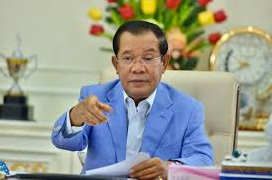
Opposition Figures Face New Hurdle in Cambodia’s Political Landscape
Cambodia’s Prime Minister Hun Sen announced plans to amend the election law, making voter participation mandatory for anyone seeking candidacy in future elections. This move, described as a way to ensure civic responsibility, is seen as a further attempt to marginalise opposition figures.
Hun Sen, who has held power for 38 years, revealed the proposal during a speech to garment workers near Phnom Penh. He explained that the amendment aims to promote accountability among aspiring candidates, stating, “How can someone serve as a member of Parliament or on local councils if they themselves refuse to vote?”
The proposed law is expected to pass with ease before the upcoming general election on July 23, as the National Assembly is entirely composed of members from Hun Sen’s Cambodian People’s Party (CPP).
Impact on Opposition and Boycotts
The change would effectively block prominent opposition leaders—many of whom are in exile—from running in future elections without requiring additional legal action. Critics argue it targets figures like those in the Candlelight Party, the main opposition group, which has already been barred from participating in the July polls due to registration issues stemming from a prior police raid.
The amendment also seeks to discourage election boycotts by forcing opposition members to vote, undermining their calls for invalid ballots or non-participation.
International Reaction
The U.S. State Department expressed concern over the exclusion of opposition parties, urging the Cambodian government to uphold democratic principles. Similarly, U.N. Secretary-General António Guterres emphasised the importance of inclusive elections, noting that a diversity of views is critical for public confidence in the electoral process.
Historical Context
The Candlelight Party is regarded as the successor to the Cambodia National Rescue Party (CNRP), which was dissolved in 2018 following accusations of plotting against the government. The disbandment allowed Hun Sen’s CPP to sweep the elections, securing all National Assembly seats.
Broader Concerns
Hun Sen has framed the voting requirement as a measure to “promote responsibility,” claiming it is not intended to defeat opponents. However, critics contend that the long-serving leader is leveraging his dominant position to entrench his power further, leaving opposition groups with diminishing avenues for political participation.
Cambodia’s July election will see 9.7 million registered voters casting ballots for 125 parliamentary seats, but without credible opposition, international observers question the legitimacy of the process.









